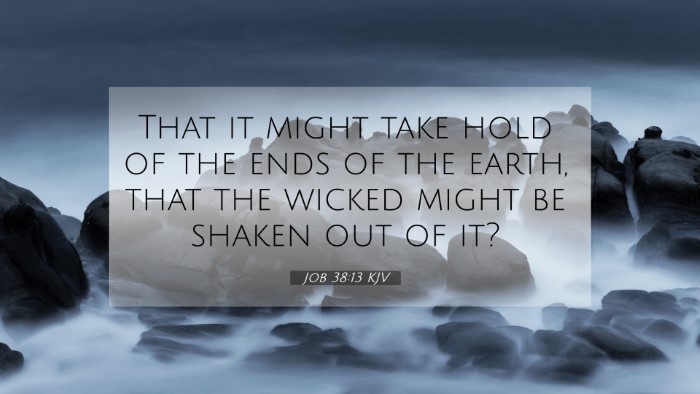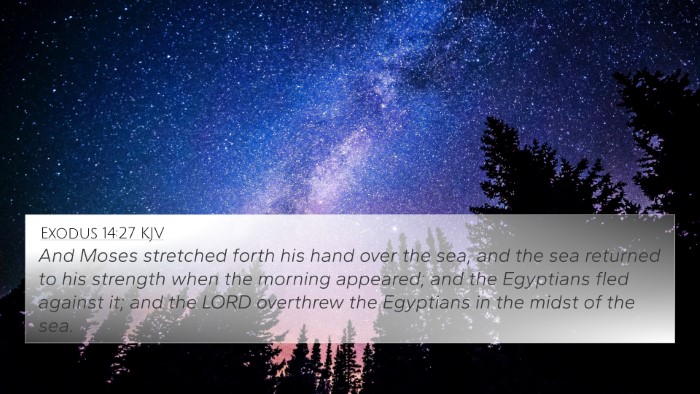Meaning and Interpretation of Job 38:13
Job 38:13 states: "That it might take hold of the ends of the earth, that the wicked might be shaken out of it." This verse presents God's voice from the whirlwind, emphasizing His absolute sovereignty over creation.
Contextual Overview
The Book of Job explores profound themes of suffering, divine justice, and the nature of God. Job, amidst his trials, questions God's governance. In response, God speaks in Job 38, revealing His power and the limitations of human understanding.
Interpretative Insights
- God’s Authority: Matthew Henry emphasizes that through this verse, God demonstrates His authority over the earth. He reinforces that all creation is under His control, able to respond according to His will.
- Wisdom of Creation: Albert Barnes points out that this verse highlights the wisdom in God’s creation, noting how all elements of the earth are subject to His command.
- Justice and Judgment: Adam Clarke interprets this as a depiction of God’s justice, wherein the wicked are targeted by His judgment, signifying how divine authority dictates morality on earth.
Theological Themes
This verse encapsulates several theological themes that emerge throughout scripture:
- God's omnipotence and sovereign rule.
- The moral order established by God's laws.
- The ultimate triumph of good over evil.
Cross-References for Job 38:13
Understanding the connections between Bible verses is crucial for a deeper insight into scripture. Here are several related verses that echo the themes present in Job 38:13:
- Psalms 104:5: "The Lord established the earth upon its foundations, so it will never move." This verse reaffirms God’s authority over creation.
- Isaiah 13:13: "Therefore I will make the heavens tremble, and the earth will be shaken from its place." This indicates God's control over the movements of the earth and a warning against the wicked.
- Matthew 24:29: "Immediately after the distress of those days, the sun will be darkened, and the moon will not give its light; the stars will fall from the sky." A New Testament verification of God’s impending judgment.
- Revelation 6:12-14: This passage describes cosmic disturbances reflecting God’s judgment upon the earth.
- Psalms 75:3: "When the earth and all its people quake, it is I who hold its pillars firm." A testament to God's holding power against chaos.
- Job 26:7: "He spreads out the northern skies over empty space; he suspends the earth over nothing." Emphasizing the majesty and might of God as the creator.
- Habakkuk 3:6: "He stood and shook the earth; he looked and made the nations tremble." Signifying God’s response to injustices.
The Utility of Cross-Referencing
Using tools for Bible cross-referencing can enhance understanding, unveiling thematic connections. Engaging in comparative Bible verse analysis helps to elucidate complex theological concepts.
For those interested in exploring the connections between Old and New Testament themes, systematic cross-referencing aids in forming a comprehensive understanding of scripture. By identifying and linking Bible scriptures, believers can grasp the cohesive narrative of God's engagement in human affairs.
Conclusion
Job 38:13 serves as a powerful reminder of God's sovereignty, authority, and the ultimate justice that prevails. Through cross-references, we can deepen our comprehension of Scripture, establishing a more profound faith amidst complexities. Utilizing resources like a Bible concordance or cross-reference Bible study guides can significantly enhance personal study and sermon preparation.









